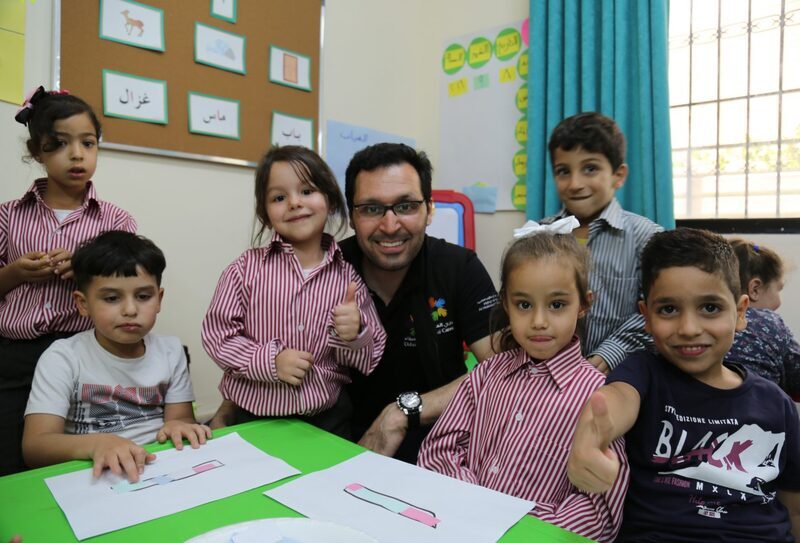
EU adopts new rules to significantly cut packaging waste with re-use targets
The European Union has formally adopted a regulation on packaging and packaging waste. The new ...

Dubai Cares has announced the recent launch of three innovative educational programmes in Jordan, aimed to empower Syrian refugees and Jordanian children, along with educators and government representatives.
The launch of the programmes was witnessed by a Dubai Cares delegation, led by the organisation’s Chief Executive Officer Dr. Tariq Al Gurg, at the Um Farwah Primary School in Jordan’s Bayader Wadi Al Seer.
Over US$7 million (AED26 million) were committed towards the three programmes which will cover an entire spectrum of educational needs across pre-primary, primary and secondary levels among refugees and host communities in Jordan.
The delegation also headed to Al-Ara’ek, a community-based organisation in East Amman’s Hay Nazzal, where a tour of the facility took place before a meeting with teachers, children and their parents, as well as the local community committee.
One of the programmes – launched in partnership with Plan International Jordan, Plan International Canada, Lamsa World and Ustad Mobile – will see over $1.5 million (AED5.5 million) invested in the pre-primary education field. The programme will provide early childhood care and development, ECCD, services for Syrian refugee children, as well as children from host communities.
A UNHCR report shows that only 69 percent of children in Jordan under the age of six – and even lower among Syrian refugees – have access to pre-primary care, and access to private KG is considered a luxury, and public provision of pre-primary services is very low.
Spanning across two years, the programme will seek to ensure that 4,000 boys and girls, aged between five and six years, are adequately prepared to enter first grade education. The programme will reach out to children across three governorates in Jordan, including the Azraq Refugee Camp. It also seeks mobilise and encourage 2,000 parents to enrol their children, increasing access to kindergartens through expansion plans.
The ECCD-focused programme also seeks to support children already enrolled into pre-primary schools, by improving the quality of established kindergartens via comprehensive teacher training programmes and psycho-social support for vulnerable children in the community.
Highlighting the importance of the programme, Dr. Tariq Al Gurg said, “Through this programme, Dubai Cares aims to support quality preschool education and stimulate caregiving services for all children. This includes supporting the Government of Jordan to achieve its objective to universalise pre-school education within the host community and refugee camps throughout the country.”
“This programme,” he continued, “is also in line with Dubai Cares’ ‘Education in Emergencies’ strategy, as it aims to support both Syrian and Jordanian children at the pre-primary level by giving them access to quality education from outset, while leveraging technology through existing mobile devices to increase outreach without additional infrastructure.”
The Dubai Cares delegation also launched the programme titled, Transforming Refugee Education towards Excellence, TREE. The programme, implemented by Save the Children and the MIT Abdul Latif Jameel World Education Lab, MIT J-WEL, aims to support the urgent need for teacher professional development, TPD, in an extremely challenging context.
Over a period of five years, the $5.5 million (AED20.2 million) TREE programme – which includes a $1.5 million contribution from Dubai Cares – involves teachers, head teachers and government representatives with the programme team to develop and refine an iterative process that focuses on two core areas to improve TPD in Jordan. This pilot programme, which is set to benefit 1,350 teachers and impact 745,000 people in Jordan, will be up-scalable to help millions of children in crisis situations.
The third programme, ‘MiyaMiya’, is a technology enabled programme focused on the reintegration of out-of-school children into secondary education, which is key to gaining access to basic job opportunities and opening pathways to higher education.
According to a UNHCR report, only around 20 percent of secondary-school-aged Syrian children are enrolled in formal education, while the rest mostly work to support their families.
Not attending secondary education prevents students from passing the final exam ‘Tawjihi’ and receiving the necessary school certification to gain access to the job market, or study further. The success rate for passing the ‘Tawjihi’ is only 32 percent among Syrian refugee youth and 40 percent among Jordanian youth, thus underlining the overall strain on teachers and the lack of investments in pedagogical capacity for decades.
MiyaMiya is supported by a consortium of global donors, including Dubai Cares, the One Foundation, the Vitol Foundation, and Chalhoub Group. Washington DC-based education technology leader Pedago, the project’s inceptor, will act as program manager, with Amman-based Questscope implementing the initiative across the Kingdom. The Queen Rania Foundation for Education and Development is providing design, research and evaluation capacity.
The European Union has formally adopted a regulation on packaging and packaging waste. The new ...
Inaugurating the Abydos Solar Power Plant in the Upper Egypt governorate of Aswan represents a ...
Businesses that fail to adapt to climate risks like extreme heat could lose up to ...


اترك تعليقا